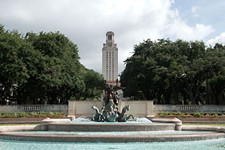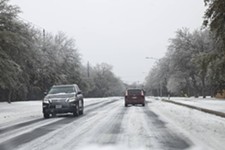It Wasn't Just ERCOT: Task Force Slams City's Freeze Response
Winter Storm Review Task Force finds fault in city's Uri response
By Kimberly Reeves, Fri., Aug. 6, 2021

A task force created to review Austin's response to Winter Storm Uri has released its draft report, which slams the city's lack of planning and preparation to handle an event that left 40% of the city without power, and then without water, for days.
At the time, all fingers pointed to ERCOT – the Electric Reliability Council of Texas, which operates the state's independent electric grid and power market and ordered Austin Energy to "shed load" during the freeze, leaving thousands in the dark and cold. But the Winter Storm Review Task Force, which is expected to present its final recommendations to City Council in about a month, offers plenty of feedback about the city's missteps: 311 operators with no answers for callers; city employees untrained to use heavy equipment to clear ice and snow; local leaders who made speeches from warm, well-lit areas while their constituents froze; and no clear strategy to reach and protect the city's most vulnerable residents.
Task force Chair Sareta Davis, who also chairs the city's Human Rights Commission, found herself drawn into the efforts of the Community Resilience Trust as the deadly winter storm bore down on Texas. Even with two weeks' notice that the region could experience a disaster, it was people on the ground like the Trust and its partners, fellow nonprofits, and mutual aid groups – not the city's professional emergency management teams – that were most responsive to people who lacked the ability or the means to weather the storm, Davis said.
"I get the idea of limited resources. I get the bottom line. I get, you know, the idea of 'funding,' but you should still have a plan to requisition funds," said Davis, adding that even getting a hotel room for someone without power was filled with difficulty. "It all feels like a run-around when, at the end of the day, nothing happens." The Trust instead turned to the SAFE Alliance and Survive to Thrive, groups that have mastered how to place people with no money (and possibly without an ID) in safe hotel rooms, to walk its volunteers through the process.
Many of the task force's pointers reflect common sense. Put a standard plan for disaster response in place – be it tornado, flood, or power outage. Create a clear chain of command. Communicate frequently, to tell Austin residents where they can turn during an emergency, and make sure that hotline is staffed, 24/7. Open lines of communication with local businesses and agencies who can participate in emergency response. And add a channel to support and reimburse the efforts of reputable volunteer organizations.
The report acknowledges that community trust has been eroded. The city doesn't come out looking great; neither do some large employers like Google and Facebook, whose lights stayed on Downtown as Austinites froze in their neighborhoods. "If Austin experiences an emergency situation, it should be, 'here's the Handbook 101.' It's well publicized. The media is involved. The community partnerships already are in place," Davis said. "We already know what we're going to do if a 'B' or 'C' happens, right? And we're partnered with Google, we're partnered with Samsung, to deal with it together."
Meanwhile, the Public Utility Commission and ERCOT say that overhauling the state's electric grid is an ongoing process. Last month, the two agencies told reporters that Texas must shift its focus from demand to supply, especially in nonrenewables. "We have been tasked with redesigning the ERCOT market for the future," PUC Chair Peter Lake said. "Historically, our market has focused on affordability first, reliability second. Now, reliability is first."
That means guaranteeing a ready and appropriate energy supply, regardless of season. The growth of renewable energy such as wind and solar – which supplement energy production heavily in the spring and summer – must be matched with more fossil fuel resources during the winter months, as well as weatherization, Lake said.
Got something to say on the subject? Send a letter to the editor.








